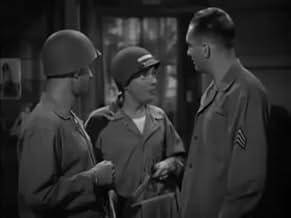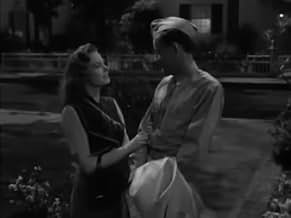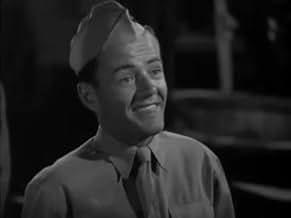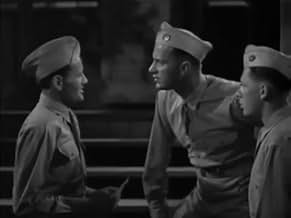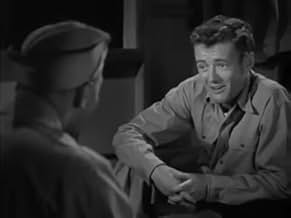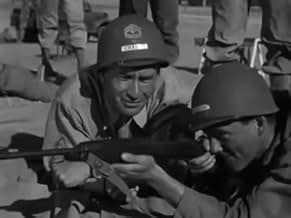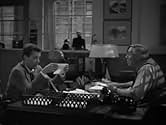Marion Hargrove, a journalist, joins the Army to write about his training experiences. During basic training at Fort Bragg, he navigates with the aid of friends who aim to share his writing ... Read allMarion Hargrove, a journalist, joins the Army to write about his training experiences. During basic training at Fort Bragg, he navigates with the aid of friends who aim to share his writing income.Marion Hargrove, a journalist, joins the Army to write about his training experiences. During basic training at Fort Bragg, he navigates with the aid of friends who aim to share his writing income.
- Director
- Writers
- Stars
- Awards
- 2 wins & 1 nomination total
William 'Bill' Phillips
- Pvt. Bill Burk
- (as Wm. 'Bill' Phillips)
Margaret Adden
- Undetermined Role
- (unconfirmed)
- (uncredited)
Morris Ankrum
- Col. Forbes
- (uncredited)
Rod Bacon
- Field Operator
- (uncredited)
Steve Barclay
- Corporal
- (uncredited)
Robert Benchley
- Mr. Holliday
- (uncredited)
- Director
- Writers
- All cast & crew
- Production, box office & more at IMDbPro
Featured reviews
Private Hargrove (Robert Walker) is one of the most inept Privates in the US Army and much of the film consists of the Sergeants trying to somehow turn this numb-skull into a decent soldier. But it all seems hopeless and we should be awfully glad there weren't more like him in the service--or else the war might have gone the other way! Oddly, however, I did notice that almost all the soldiers were skinny little squirts--the must rugged among them being Keenan Wynn! In some ways, the film plays a bit like "No Time For Sergeants" but without the hillbilly angle--consisting of a series of screw ups and comedic situations in boot camp and very, very little evidence that an actual war is taking place! However, the film takes a romantic turn when Walker is tricked into a date with lovely Donna Reed. When the two fall in love, the joke's on the fellows who set him up with her. This part of the film is quite sweet and helps to create a more well-rounded film--not just a typical army comedy. And, because he now has some focus in his life, he improves as a soldier and actually is promoted to acting Corporal...which takes him completely by surprise. So can Hargrove get the girl AND be a success in the Army? Tune in and see.
Overall, this is a very slight but pleasant film. Sure, it's a piece of fluff...but nice fluff. There is a sequel--which I have not yet seen. Considering that this was a decent and likable film, I might just give "What next, Corporal Hargrove?" a look.
Overall, this is a very slight but pleasant film. Sure, it's a piece of fluff...but nice fluff. There is a sequel--which I have not yet seen. Considering that this was a decent and likable film, I might just give "What next, Corporal Hargrove?" a look.
More than 5,000,000 men entered the armed services in World War II and movies like See Here, Private Hargroves was an attempt to assure the folks back home and incoming draftees that Army life could be swell. You may have to scrub a few garbage cans but you will make buddies that will last a lifetime and get a chance to meet and fall in love with a beauty like Donna Reed. Even a screw-up like Hargrove eventually becomes a member of the best gunnery team in the battery and earn the respect of the drill instructors that once tormented him. One character even tells Hargrove that he will remember his Army service as the best times of his life.
This is the third time I have seen Robert Walker snr. playing a corporal in his film roles.In chronological order first was this film (1943), albeit he was only "promoted" for one day; second in "Since You Went Away"(1944) and third in "The Clock"(1945).He stated that his challenge was to play the real life role of Marion Hargrove "appealing without resorting to buffoonery".The Producer had assembled an experienced support cast including Ray Collins, Keenan Wynn, Robert Benchley, Chill Wills and Donna Reed his love interest in the film with "more purity than passion".He admitted to a twinge of guilt (even though he was only acting) when he had to kiss her on screen since he was still married at the time to Jennifer Jones,his beloved "Phyl" (real name Phylis Isley/Walker.) I had never seen this film on mainstream terrestial analogue UK TV networks, neither had I seen it screened on our version of TCM nor other classic TV movie digital channels nor has it been made commercially available to my knowledge either as a DVD or VHS video.This is probably because the owners of the film rights considered it would not have sufficient commercial appeal.Nevertheless I tracked it down to a rare American video dealer on the internet and my son bought it for me as a Christmas present, since he knows how I love classic 1940s films.The reason I am interested in Robert Walker snr. is that he was married for five years to Jennifer Jones (whom I have been a fan of for years having collected all her films on video/DVD).I then spread my interest to other actors associated with her.I still think however that "Strangers on a Train" (1950) is Robert Walker's best film.
"See Here Private Hargrove" is an autobiographical innocuous comedy by Marion Hargrove (who wrote the best selling book) and who is played by Robert Walker.He starts the comedy as an ineffective newspaper reporter who has talent for writing but just cannot follow through effectively.He is then willingly packed off by his editor when he (Hargrove) is called up to join "Uncle Sam" at a North Carolina army training camp during WWII.He is assigned to training on artillery but spends most of his time there cleaning dustbins (due to a great inability to keep to the disciplined army rules).As a punishment he suffers what Americans call "KP".Does this mean "kitchen punishment"?For one glorious day he is promoted to corporal for an exercise where the blue team have to out-manoeuvre the red team but despite showing individual initiative he only succeeds in leading his company into the wrong team's HQ, because he still cannot follow through effectively.
His best friend at the camp (played by real life friend Keenan Wynn whom he met earlier in New York during his first professional radio days), tries to cheat him at every opportunity taking advantage of his talent for writing and gets him to sign a fraudulent assignation of all his present and future royalties in the hope that some day he will be a famous best selling author.Due to Marion's talent for writing, they "wangle" a soft option in the camp's public relations department but after a while they yearn to be back again with their buddies in the artillery.They only just manage to do this before the brigade is moved out to go on active duty.The plot is very gentle, has simple humour, is patriotic and uncontroversial and presumably was seen by the "brass" in 1943 as approved relaxing viewing for soldiers.To young 21st century eyes the plot seems naive but it was Robert Walker's first leading role at a time when it was important to keep up the public's morale in the middle of the war.His then wife, Jennifer Jones was filming her first leading role at 20th Century Fox playing Bernadette Soubirous in "Song of Bernadette"(1943) for which of course she won the "Oscar" for best actress at the 1944 awards ceremony.
I understand there is a sequel to this film "What Next Private Hargrove" (1945) again starring Robert Walker in the title role with his friend Keenan Wynn.It would be interesting to see the user comments for the latter film on IMDb.com and how the plot was subsequently developed.
"See Here Private Hargrove" is an autobiographical innocuous comedy by Marion Hargrove (who wrote the best selling book) and who is played by Robert Walker.He starts the comedy as an ineffective newspaper reporter who has talent for writing but just cannot follow through effectively.He is then willingly packed off by his editor when he (Hargrove) is called up to join "Uncle Sam" at a North Carolina army training camp during WWII.He is assigned to training on artillery but spends most of his time there cleaning dustbins (due to a great inability to keep to the disciplined army rules).As a punishment he suffers what Americans call "KP".Does this mean "kitchen punishment"?For one glorious day he is promoted to corporal for an exercise where the blue team have to out-manoeuvre the red team but despite showing individual initiative he only succeeds in leading his company into the wrong team's HQ, because he still cannot follow through effectively.
His best friend at the camp (played by real life friend Keenan Wynn whom he met earlier in New York during his first professional radio days), tries to cheat him at every opportunity taking advantage of his talent for writing and gets him to sign a fraudulent assignation of all his present and future royalties in the hope that some day he will be a famous best selling author.Due to Marion's talent for writing, they "wangle" a soft option in the camp's public relations department but after a while they yearn to be back again with their buddies in the artillery.They only just manage to do this before the brigade is moved out to go on active duty.The plot is very gentle, has simple humour, is patriotic and uncontroversial and presumably was seen by the "brass" in 1943 as approved relaxing viewing for soldiers.To young 21st century eyes the plot seems naive but it was Robert Walker's first leading role at a time when it was important to keep up the public's morale in the middle of the war.His then wife, Jennifer Jones was filming her first leading role at 20th Century Fox playing Bernadette Soubirous in "Song of Bernadette"(1943) for which of course she won the "Oscar" for best actress at the 1944 awards ceremony.
I understand there is a sequel to this film "What Next Private Hargrove" (1945) again starring Robert Walker in the title role with his friend Keenan Wynn.It would be interesting to see the user comments for the latter film on IMDb.com and how the plot was subsequently developed.
The movie is a light, romantic comedy that takes place at boot camp during WW2. It is not played like the Abbott and Costello movies and I don't think it was meant to be. It deals with a young, somewhat hapless young man who continually tries to do the right thing but ultimately goofs it up.
Robert Walker (Hargrove) starts out as an aspiring newspaper reporter that never quite gets the story complete. He is drafted and the fun begins. He just can't quite get the proper way to do things in the Army and, as a result, gets to spend time on KP (anyone who was in the Army will certainly remember that there was a "Hargrove" in their company). Then he meets Donna Reed (Carol Holliday) and that give him the incentive to do try to do better. However, he is still the Hargrove we have been seeing and the fun continues.
As you watch this be sure to pay attention to the supporting roles. They add a lot to the movie. Plus there are serious moments that also plays to the patriotic spirit that was in the country at that time (the movie was released in 1943). This is a fun movie, don't miss it. 8/10
Robert Walker (Hargrove) starts out as an aspiring newspaper reporter that never quite gets the story complete. He is drafted and the fun begins. He just can't quite get the proper way to do things in the Army and, as a result, gets to spend time on KP (anyone who was in the Army will certainly remember that there was a "Hargrove" in their company). Then he meets Donna Reed (Carol Holliday) and that give him the incentive to do try to do better. However, he is still the Hargrove we have been seeing and the fun continues.
As you watch this be sure to pay attention to the supporting roles. They add a lot to the movie. Plus there are serious moments that also plays to the patriotic spirit that was in the country at that time (the movie was released in 1943). This is a fun movie, don't miss it. 8/10
Robert Walker plays an extremely skinny private in the United States Army during the midst of World War Two. He scrubs lots of garbage cans and gets to woo a lovely Donna Reed. As an "in the army" genre movie the film has more of a peace time vibe to it than one that was produced during the biggest war of the twentieth century. It would be hard to imagine Germany or Japan cranking out cinematic fluff like this in 1944. It perhaps reflects the fact that the mainland of the United States was not suffering the effects of total war like other countries. The lighthearted tone also might indicate the underlying confidence the country was feeling about ultimately winning the war at the time.
Did you know
- TriviaMarion Hargrove asked permission to consult on the movie, but the Army denied his request. He had been promoted to sergeant by the time this picture was completed. The Army even denied his request to see a preview of the film.
- Quotes
Pvt. Marion Hargrove: I'm so used to K.P. that even in Fayetteville, if I see a garbage can on the street, I stop and polish it.
- ConnectionsFollowed by What Next, Corporal Hargrove? (1945)
- SoundtracksIn My Arms
(1944) (uncredited)
Lyrics by Frank Loesser
Music by Ted Grouya
Variations played in the opening credits and often throughout the movie
Sung by Bob Crosby and the soldiers in the canteen
Partially sung later by Robert Walker with modified lyrics
Details
- Release date
- Country of origin
- Language
- Also known as
- Oiga señor recluta
- Filming locations
- Camp Roberts, California, USA(summer scenes)
- Production company
- See more company credits at IMDbPro
- Runtime
- 1h 41m(101 min)
- Color
- Aspect ratio
- 1.37 : 1
Contribute to this page
Suggest an edit or add missing content


